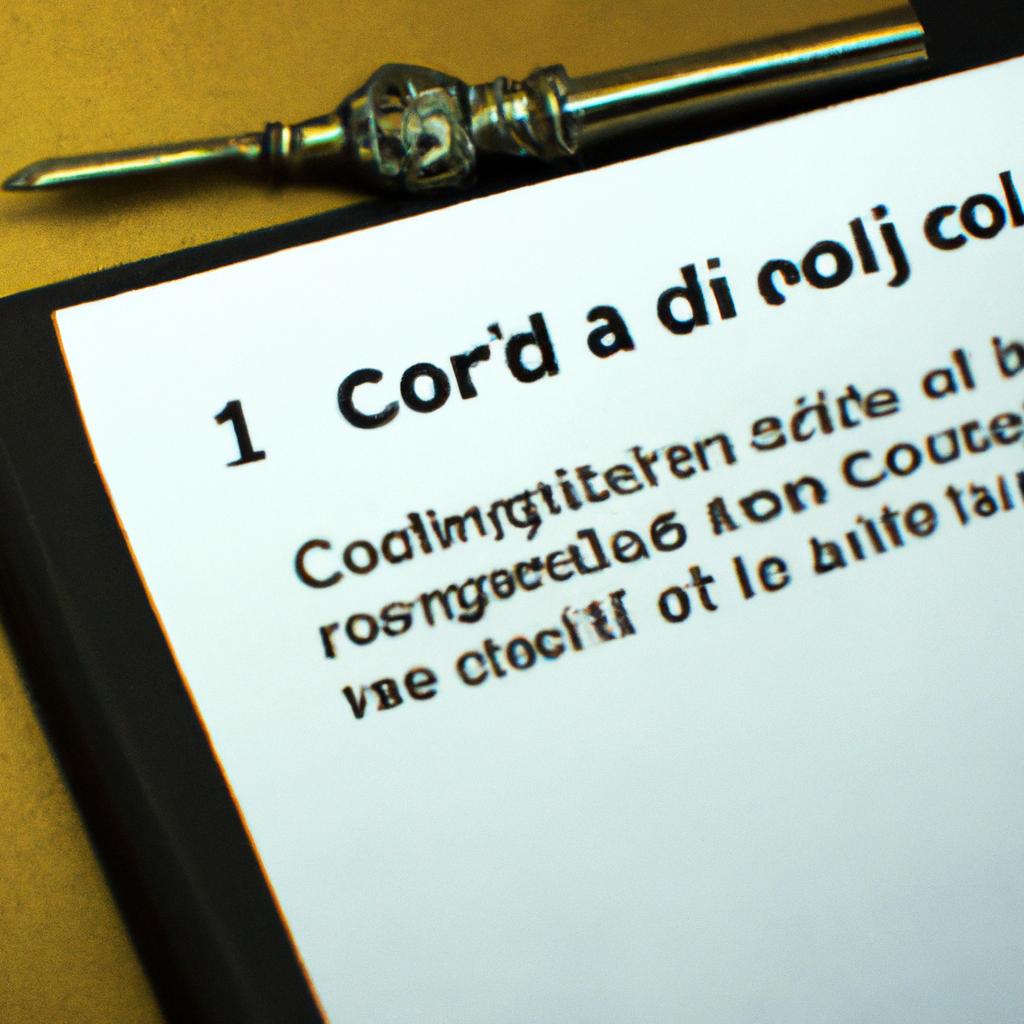In the complex world of estate planning, the intricacies of wills and trusts can sometimes leave individuals questioning the validity and flexibility of their carefully crafted documents. Enter the codicil - a lesser-known but invaluable tool that allows individuals to modify or amend their will without the need for costly and time-consuming rewrites. As seasoned legal professionals at Morgan Legal Group in the heart of New York City, we specialize in navigating the nuances of estate planning, probate, elder law, and everything in between. Join us as we delve into the significance and implications of codicils in wills, shedding light on this often overlooked avenue for testamentary alterations.
Understanding the Purpose of a Codicil in a Will
When creating a last will and testament, it is essential to understand the purpose of a codicil. A codicil is a legal document that is used to make amendments or additions to an existing will without completely revoking it. It is often used when a testator wants to make minor changes to their will, such as updating beneficiary information, changing the executor, or adding new assets. A codicil must be executed with the same formalities as a will and should clearly reference the original will to avoid any confusion.
One of the main benefits of using a codicil is that it allows for flexibility in estate planning. Instead of having to create an entirely new will, a codicil enables the testator to make changes as needed while still keeping the original intent of the will intact. Additionally, a codicil can be kept with the original will to ensure that all updates are easily accessible and legally binding. It is important to seek the advice of an experienced estate planning attorney when considering the use of a codicil to ensure that all legal requirements are met and that the document accurately reflects the testator’s wishes.

Key Considerations Before Drafting a Codicil
When considering drafting a codicil to a will, there are several key considerations that must be taken into account to ensure that the document is legally binding and effectively achieves the desired changes to the will. One important consideration is to clearly identify the changes that need to be made to the original will. This may include adding or removing beneficiaries, changing the distribution of assets, or making amendments to specific clauses within the will.
Additionally, it is crucial to review the existing will to ensure that the proposed changes do not conflict with any other provisions or instructions within the document. It is also important to consult with an experienced estate planning attorney to ensure that the codicil complies with all relevant laws and regulations. By carefully considering these key factors before drafting a codicil, individuals can ensure that their final wishes are accurately reflected and legally enforceable.

Importance of Consulting an Experienced Estate Planning Attorney
When it comes to the , it cannot be overstated. Planning for the distribution of your assets after you pass away is a critical step that should not be taken lightly. An experienced attorney can provide invaluable guidance and expertise in navigating the complex legal landscape of estate planning.
One important aspect of estate planning is the creation of a will. A will outlines how you want your assets to be distributed upon your death. However, circumstances may change after you create your will, leading you to make amendments. This is where a codicil comes in. A codicil is a legal document that allows you to make changes to your existing will without having to create an entirely new one. Consulting with an experienced estate planning attorney to draft a codicil can ensure that your wishes are carried out accurately and legally.

Ensuring Validity and Compliance with Legal Requirements
When it comes to ensuring the validity and compliance with legal requirements in estate planning, understanding the concept of a codicil in a will is crucial. A codicil is a legal document that allows you to make amendments or additions to an existing will without having to create a new one entirely. It is a useful tool for updating your will to reflect any changes in your circumstances or wishes.
A codicil must meet certain legal requirements to be valid, such as being in writing, signed by the testator, and witnessed by at least two competent witnesses. It is important to ensure that the codicil is clear, unambiguous, and does not contradict the original will. By working with experienced professionals like the Morgan Legal Group in New York City, you can ensure that your codicil is drafted correctly and complies with all legal requirements, providing you with peace of mind that your wishes will be carried out effectively.
Q&A
Q: What is a codicil in a will?
A: A codicil is a legal document that allows you to make changes to your existing will without needing to rewrite the entire document.
Q: What can be changed in a codicil?
A: You can use a codicil to make minor changes to your will, such as updating beneficiary information, adding or removing specific assets, or altering distribution percentages.
Q: When should someone consider using a codicil?
A: A codicil can be useful when you want to make minor adjustments to your will but don’t want to create an entirely new document. It is also helpful if you want to make changes quickly without going through the process of creating a new will.
Q: Is a codicil legally binding?
A: Yes, a codicil is legally binding as long as it meets all the legal requirements for a valid will amendment. This includes being signed and witnessed in accordance with state laws.
Q: Can a codicil be used to completely revoke a will?
A: Yes, a codicil can be used to revoke a will in its entirety. However, it is important to consult with an attorney to ensure that the revocation is done properly and in accordance with state laws.
Q: Are there any limitations to what can be changed in a codicil?
A: While a codicil allows for minor changes to be made to a will, there may be limitations on what can be altered. For example, some states may require major changes, such as changing beneficiaries or executorship, to be made in a new will rather than a codicil.
The Conclusion
In conclusion, a codicil in a will is a valuable tool for making changes or additions to a will without having to create a completely new document. By understanding the purpose and requirements of a codicil, individuals can ensure that their final wishes are accurately reflected and legally binding. Whether making minor amendments or significant updates, a codicil provides the flexibility needed to adapt to changing circumstances and protect the legacy left behind. As always, it is recommended to consult with a legal professional when creating or updating a will to ensure that all requirements are met and that the document accurately reflects your intentions. With a codicil, you can rest assured that your wishes will be carried out exactly as you intended.
 A codicil is a legal document that is used to make changes or additions to an individual’s last will and testament. It is commonly referred to as an amendment to a person’s will. Adding a codicil to a will allows individuals to make changes without having to rewrite the entire will. This article will provide readers with a comprehensive understanding of what a codicil is, its purpose, benefits, and practical tips.
A codicil is a legal document that is used to make changes or additions to an individual’s last will and testament. It is commonly referred to as an amendment to a person’s will. Adding a codicil to a will allows individuals to make changes without having to rewrite the entire will. This article will provide readers with a comprehensive understanding of what a codicil is, its purpose, benefits, and practical tips.
Purpose of a Codicil in a Will
The primary purpose of a codicil in a will is to make changes or additions to the document. A will outlines an individual’s desires for the distribution of their estate after their death. However, life is unpredictable, and circumstances may change, leading to the need for changes in the will. A codicil allows individuals to make these changes with ease and without jeopardizing the validity of the entire will.
Possible Changes That Can Be Made Through a Codicil
A codicil can be used to make various changes to a will, including but not limited to:
1. Changes to Beneficiaries
Individuals may want to add or remove beneficiaries from their will as their relationships with certain individuals change. A codicil can be used to add or remove beneficiaries from a will without having to rewrite the entire document.
2. Changes to the Distribution of Assets
Life events such as the birth of a child or the acquisition of new assets may lead to changes in how a person wants their estate to be distributed. A codicil can be used to specify these changes, ensuring that the assets are distributed according to the individual’s wishes.
3. Appointment of a New Executor
An executor is responsible for managing the distribution of assets outlined in a will. Sometimes, the person originally appointed as an executor may no longer be able to serve in this role, and a new one may need to be appointed. A codicil can be used to designate a new executor and revoke the previous appointment.
4. Changes in Funeral Arrangements
A person may have specific wishes for their funeral or burial arrangements. They may also want to designate a different person to make these decisions on their behalf. A codicil can be used to outline these changes and ensure that their funeral wishes are carried out after their passing.
Benefits of Using a Codicil in a Will
1. Saves Time and Money
Making changes to a will through a codicil is much quicker and less expensive than rewriting the entire document. It also eliminates the need for legal fees associated with creating a new will.
2. Avoids Confusion and Disputes
By making changes through a codicil, individuals can clearly communicate their wishes, leaving no room for confusion or disputes among family members and beneficiaries.
3. Flexibility
Life is dynamic, and things change continuously. A codicil allows individuals to make changes to their will as needed, ensuring that their final wishes are always up to date.
Practical Tips for Using a Codicil
1. Be Specific in Your Changes
When using a codicil, it’s important to be specific and thorough in your changes to avoid any ambiguity. Ambiguous or unclear changes may lead to confusion and disputes after you pass away.
2. Follow Proper Legal Procedures
A codicil must be executed following the same legal procedures as a will. This includes signing the document in the presence of witnesses and having it notarized.
3. Keep Your Codicil Updated
It’s recommended to periodically review your will and codicil to ensure that they accurately reflect your current wishes. If needed, make changes to your codicil to avoid any issues down the line.
In Conclusion
A codicil is a valuable legal document that allows individuals to make changes to their will without having to rewrite the entire document. With its flexibility and ease of use, a codicil is an essential tool for anyone who wants to ensure that their final wishes are always up to date. However, it’s crucial to follow proper legal procedures, be specific in your changes, and periodically review and update your codicil to avoid any confusion or disputes after you pass away.





